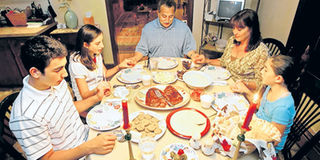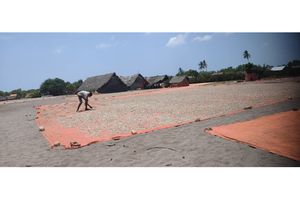In the spirit of Ramadhan, I link up with displaced family

A family gathers for an iftar in the United States. PHOTO|FILE
What you need to know:
- Three weeks on, the hunger pangs have disappeared. The early-morning wake-up feels normal. And the daily iftars with my husband and kids are a treasured experience I look forward to every day.
Washington. One more week to go. As I write these words, I’m struck by how much I’m going to miss this month. When Ramadhan started, I was nervous, even stressed, about how I was going to get through 16 hours of daily fasting.
Three weeks on, the hunger pangs have disappeared. The early-morning wake-up feels normal. And the daily iftars with my husband and kids are a treasured experience I look forward to every day.
This Ramadhan, I’ve learned more about my inner strength. I’ve fasted most of my life, but never for this long. Now I know that not only can I handle the long hours of fasting, I can do it while still managing to live up to my parental and professional responsibilities.
There is one thing that’s been missing, though. Ramadhan is as much about family and community as it is about spirituality and discipline. Having grown up in the United States and often living far from my parents, I’ve grown used to the quiet iftars with my own little family. But I miss my larger family, scattered to all corners of the earth by a horrendous war.
Almost every single member of my family was displaced by the war in Syria. They wound up in Turkey, United Arab Emirates, Belarus, Germany, the United Kingdom and the United States. Some remain in Syria. We are everywhere. I wanted to know what Ramadhan has been like for them, how has the war changed the experience of the holy month for them.
Life takes over, and suddenly you realize there are members of your family you haven’t spoken to in months, even years. When I began reaching out to them for this latest Ramadhan journal installment, I realized I knew little about how they were adjusting to their new lives. They all had one common theme — everyone misses their family iftars, the moment when a group of at least 10 people sat down at the dinner table to break their fast. They also told me the spirit of Ramadhan, the one that I remembered so vividly as a child, was diminished if not altogether gone.
I spoke to several members of my family but am including excerpts from my talks with two: my cousin Reem Khateeb, 27, who lives in the United Kingdom, and my mother’s cousin, Abir Mahayni, a teacher in her 50s, who still lives in Damascus. I’ll start with Abir, who is one of the few remaining family members there. She spoke to me while sitting on her balcony. It was 1 a.m. her time, and I could hear the sound of blaring music coming from a restaurant nearby.
After years of war and uncertainty, Abir says, a new normal is setting in, and people are adjusting. But she wanted to make sure I knew that this was the case only in Damascus, and even then, only certain neighbourhoods.
To Abir:
How has Ramadhan changed since the war began?
From what I see, a lot of people aren’t fasting anymore. Those who are fasting and committed, they endure, they are patient. They might sleep a bit more during the day or have a siesta. Iftar is around 7:50 p.m. A lot of people I know stay up late until the fajr (dawn) call to prayer, and then they sleep late. People can go to work an hour later and leave work an hour earlier so people can go and rest.
Has the spirit of Ramadhan changed since the war began?
Yes. It has changed. We used to have gatherings. I don’t know if you remember, you’ve been to one or two of them. We gather 30 people at home. More people, every single day — the smallest number of people was 10 sitting at the table breaking their fast together, then praying together. Now we are only three — my son, and daughter and I. And that’s it. And the most we can gather are nine people — that’s the remainder of the family. The rest have all left the country.
With the rising cost of food, how are people able to put food on the table?
People tend to be more generous toward the needy in Ramadhan. Zakat (a mandatory form of charity in Islam) is collected and distributed to those in need. Mostly orphans, the elderly and people with special needs. Those are the priority. But neighbours look after each other; relatives too. So the community tends to be stronger in the month of fasting.
You mentioned that you noticed fewer people are fasting. Why do you think that is?
There is a new trend among millennials. They have increasing doubts about religion. They are asking, “Why do we have to follow this sheikh or that sheikh?” They are searching for the truth themselves. When they see so much misery, many people are asking, “Why did God do that to us, what did we do?” They are just rejecting everything.
My cousin, Reem (named after me), left Syria for the UK less than two years ago. She described a similar situation.
Many people in Ramadhan stopped fasting. That’s what happened in Aleppo. They even ate in public parks. I never asked them why.
To my cousin Reem:
What is fasting like for you in a new country, far away from family?
When I was young, I used to feel incredible joy when the holy month was coming. I used to feel blessed. But I no longer have that feeling. It may be because I don’t yet have a strong social network. I used to feel at peace during Ramadhan. Now it just feels like another day is passing by where I’m just depriving myself of eating and drinking. That sense of peace is gone.
Why do you think that is?
Ramadhan is a time to increase family times. I used to know with certainty that I would be spending every evening with my grandparents and my parents. That’s gone now. The other reason, I’m very sad to say, is this feeling of peace and security started disappearing long before I got to the UK. When you live in a situation of war, you lose all sense of peace, of feeling blessed. You constantly think that you could die at any moment. And this feeling has continued on with me. I now realize that our time is limited. No one knows when they are going to die. That feeling of peace, security and calmness is gone.




